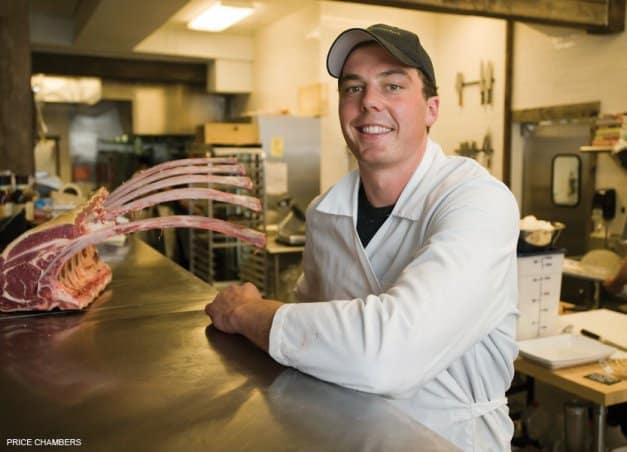Read The
Current Issue
Meat Your Butcher
Our area’s artisan butchers are a cut above the rest.
BY SUE MUNCASTER

In December 2009 Epicurious.com, the authoritative and award-winning digital voice of the food world, boldly predicted 2010 would be “The Year of the Butcher.” Earlier that same year, Kim Severson wrote the article “Young Idols with Cleavers Rule the Stage” in The New York Times. Severson, who has won four James Beard awards for her reporting, revealed how a new meat consciousness has led to the rise of the “rock-star butcher.”
The rise (or revival) of artisan butchery here in the Tetons has certainly followed Epicurious’ predictions and Severson’s observations. Fifteen years ago, the only prosciutto to be found in Jackson Hole—if any was to be found at all—was packaged.
Menus didn’t mention where your steak came from. Today, we have multiple restaurants making their own sausages and salumi. You can walk into a market and chat with the man behind its house-made bresaola and guanciale. Buy a rib-eye at Aspens Market and it won’t just be a rib-eye, but a hormone- and antibiotic-free, grass-fed Robinson Family Farms rib-eye. The butcher can show you a dozen other cuts he made from the same cow.
Jacksonholefoodie.com blogger and retired physician Annie Fenn loves this shift. “The mom in me wants to know that the meat I serve my family is safe and humane. Because my butchers [Joel Cox from Aspens Market and Derek Ellis of Ellis Custom Meats] have a track record with the ranchers who supply them, I know the product is good,” Fenn says. “The foodie in me loves playing around with unique cuts of meat and having a huge variety in what I cook.”
“Got knives, will travel” is the motto that landed Cox at Aspens Market in 2011. Behind the market’s meat counter almost every day, you can’t miss him—tall, strapping, with dark, curly hair and often brandishing a razor-sharp knife. Cox butchers one grass-fed, antibiotic- and hormone-free pig per week and also, depending on demand, a cow or two per month. He buys his animals from Robinson Family Farms in Bedford, Wyoming.
Cox works like most any other artisan who takes great care in the details of what they do. Strong and sure, he sharpens his knife before doing anything else. His first slice, along the diaphragm of the hanging pig, goes through the flesh, muscles, and tendons like butter. Moving through the animal, he wastes nothing: organ meats are used for pâtés, while bones are used to make stocks for the market’s soups or are treats for lucky dogs. Cox renders the pork fat, melting it slowly so the pure lard separates from everything else. At the end, he’s left with coarse, crunchy bits—“cracklings”—that can be sprinkled on salads. When Cox does Market Table Dinners, the menu often includes a course or two featuring a specialty cut you’ve most likely never heard of and which Cox can rhapsodize about for hours.
Like most artisan butchers, Cox learned by studying under a master. Or, in his case, two: Morgan Brownlow, the chef and butcher behind some of Portland and Seattle’s most lauded restaurants, and Dario Cecchini, quite possibly the most highly regarded butcher in butcher-rich Italy. During his nineteen months abroad, Cox studied cured meats, pasta making, cheese making, and Italian cooking and interned under Cecchini, who was introduced to American foodies by writer Bill Buford, first in an article for The New Yorker and later in Buford’s best-selling book, Heat.
Lines stretch out of Cecchini’s shop in Panzano. At Aspens Market, people queue for Cox’s hand-packed breakfast and specialty sausages, peppered beef tenderloin, and pork chops and loins. He loves to experiment and is most proud of his cured meats made from pork: coppa and lardo. The former is from the shoulder muscle and is a wonderful combination of meat and fat, heady from the aromatic spices and herbs in which it is cured. The latter is made by curing strips of fatback with rosemary and other herbs, then wrapped in cheesecloth and hung to dry.
Cox guesses only 40 percent of his clients are aware of his “whole animal” sourcing. He likes to educate, but not preach. When asked why someone should buy a handcrafted sausage made by him versus a packaged, less expensive one from the supermarket, he glances up from slicing a giant pork shoulder: “Flavor. When it’s fresh, nothing is being masked. It’s not industrial and it’s not processed. Once you’ve had it, it’s hard to go back.”
“Artisan” and “fancy” need not go hand in hand. Dee J Rammell, proprietor of Hog Island Meats, a Wyoming-inspected processing facility for domestic animals and wild game south of Jackson, is every bit as artisan as he is the salt of the earth. If you want to make headcheese, he’ll happily process the head. Rammell learned his craft from three generations of family butchers.
Rammell figures butchering is in his blood. “I remember helping my father and grandfather as a five-year-old at Rammell Valley Pack in Tetonia, Idaho,” he says. “Ever since I was in high school, I’ve been processing meat.” Today, he and his wife, Tamara, run their shop just steps from their home. Their five children, ranging from kindergarten to high school, help out.
Whatever the beast, the Rammells’ business motto is “Your Meat, Your Way.” They’ll entertain any special request. They can slaughter an animal in accordance with religious traditions. They can dry-age meat for up to three weeks, or brine it, wet-age it, or smoke it. Their specialties are homestyle hams, bacon, Italian and breakfast sausages, and jerky. If you want to roast a whole pig for a luau, they’ll prep it just right. And they’re happy to help you make headcheese.
Teton Valley’s Derek Ellis runs Ellis Custom Meats, which he opened in 2010, in the same vein. For years prior, Ellis had helped his friend Jed Restuccia, the founder of Cosmic Apple Gardens organic farm in Victor, Idaho, with crops and chores. Ellis knew Restuccia was bothered for many reasons about the distance his certified organic and biodynamic animals had to travel to be slaughtered—about eighty miles to Rigby, Idaho. Restuccia saw firsthand that the trip stressed his animals. He believed stressing the animals was not only inhumane, but also affected the taste of the meat. Ellis, who had been working at Intermountain Aquatics, happened to be looking to make a life change.
Ellis took on an intensive three-month internship at one of America’s most celebrated butchers, Fleisher’s Grass-fed and Organic Meats, which Joshua and Jessica Applestone opened in 2005 in Kingston, New York. (Even though the Applestones only opened their butcher shop in 2005, Joshua Applestone’s grandfather opened the original Fleisher’s kosher butcher shop in Brooklyn in 1901.)
Since opening, the Applestones have trained dozens of young butchers, releasing them to go on to become rock stars of their own (Tom Mylan of Brooklyn’s Marlow & Daughters), write books (Julie Powell, who authored the best-seller Julie and Julia, which was later adapted into a blockbuster movie of the same name, wrote Cleaving: A Story of Marriage, Meat, and Obsession about her time at Fleisher’s), and save Teton Valley farmers from having to ship their animals miles to slaughter.
Competition for a Fleisher’s internship is intense. Some interns pay $10,000 for six to eight weeks of instruction and a bed in the Applestones’ Airstream trailer. Ellis was in the Hudson Valley for three months.
Ellis’ philosophy is to work with animals raised on small, local, sustainable farms on an antibiotic- and hormone-free vegetarian diet. He has certifications for both mobile slaughter and custom processing from the State of Idaho Department of Agriculture. The mobile slaughter license allows him to kill animals on-site at area farms and ranches before transporting them to the commercial kitchen in Victor where he does his custom processing. At the same facility, Ellis also processes game meat that hunters bring him. For consumers without their own animals, Ellis runs intermediary with local farms. Clients can buy portions of lamb, pig, bison, or cow through him and then specify how they want him to process it.
In addition to the usual rib-eyes and tenderloins, Ellis does smoked bacon and pancetta, guanciale (Italian bacon made with pig jowls), pork rillettes (similar to pâté), and a wide variety of smoked or fresh sausages prepared from everything from lamb to elk.
At Local, their contemporary steakhouse on the Town Square, chefs Will Bradof and Paul Wireman’s mission is meat, butchered and prepared in-house. Bradof trained for two years at the Culinary Institute of America in New York. He was further inspired toward artisan butchery while working at Napa Valley’s Tra Vigne. There, chef Michael Chiarello, the Culinary Institute of America’s Chef of the Year (1995) and Alumni of the Year (2011) and host of shows on PBS, Food Network, Fine Living, and the Cooking Channel, taught Bradof how to make charcuterie—prepared meat products such as bacon, ham, sausage, terrines, galantines, pâtés, and confit. Bradof also learned how to incorporate them into a menu. After Tra Vigne, Bradof moved to Tuscany and exchanged work for six months’ board with an Italian couple who owned a wine bar and restaurant in Volterra.
Bradof and Wireman had house-made charcuterie on a small scale at their first Jackson restaurant, Trio: duck prosciutto, bresaola (air-dried, salted beef), and foie gras torchon (a very traditional yet complicated terrine). People loved it. This success was the impetus to open Local, where a much larger kitchen houses a huge grinder, meat saw, and sausage-stuffer. Every week now, Bradof and Wireman buy a whole grass-fed, organic cow from the Lockhart Cattle Company, a family run ranch in South Park that has been raising Herefords since the 1930s. Less frequently, the two men experiment with locally sourced pigs, duck, elk, and pheasant. Depending on which of these are available, you might find on Local’s (or Trio’s) menu prosciutto, guanciale, foie gras, country-style pork pâté, and elk or pheasant sausages. “People are really excited about the food, and I’m excited about making it,” Bradof says.




